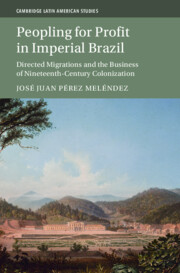 Peopling for Profit in Imperial Brazil
Peopling for Profit in Imperial Brazil from Part II - Colonization Companies and the Colono Trade
Published online by Cambridge University Press: 26 September 2024
Brazil accompanied global mid-century changes with its own great transformation in 1850: three landmark laws on the slave trade, land, and commerce that in theory aligned state-building with market forces. Yet, if premised on colonization as a substitute for slavery, the country’s transformation was in fact a circuitous one, as abolitionists’, planters’ and the government’s own efforts pointed in different directions. As the illegal slave trade endured after 1850, Brazilian abolitionists organized a new association to promote model colonies built from the ground up, but their efforts paled in comparison to the private colonization undertaken by wealthy Paraíba Valley planters. Historians assume that this coffee-growing elite held sway over the Brazilian state, but their colonization approaches suggest otherwise. The imperial government was more interested in promoting myriad new colonization endeavors across the Empire, including in the northeastern provinces, and using colonization for its own geopolitical needs. Conflicting uses of colonization laid bare not only the failure of government-directed initiatives to appease divergent regional interests, but also the ways in which colonization complicated rather than facilitated a purported transition toward free labor and an alignment of state and market interests.
To save this book to your Kindle, first ensure no-reply@cambridge.org is added to your Approved Personal Document E-mail List under your Personal Document Settings on the Manage Your Content and Devices page of your Amazon account. Then enter the ‘name’ part of your Kindle email address below. Find out more about saving to your Kindle.
Note you can select to save to either the @free.kindle.com or @kindle.com variations. ‘@free.kindle.com’ emails are free but can only be saved to your device when it is connected to wi-fi. ‘@kindle.com’ emails can be delivered even when you are not connected to wi-fi, but note that service fees apply.
Find out more about the Kindle Personal Document Service.
To save content items to your account, please confirm that you agree to abide by our usage policies. If this is the first time you use this feature, you will be asked to authorise Cambridge Core to connect with your account. Find out more about saving content to Dropbox.
To save content items to your account, please confirm that you agree to abide by our usage policies. If this is the first time you use this feature, you will be asked to authorise Cambridge Core to connect with your account. Find out more about saving content to Google Drive.